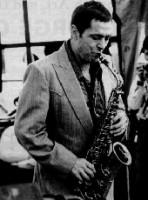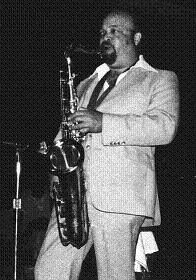| B i o g r a p h y |
 Art Pepper
Art Pepper
1 September 1925, Gardena, Los Angeles, California, USA, d. 15 June
1982, Panorama City, California, USA. Pepper started out on clarinet at
the age of nine, switching to alto saxophone four years later. After
appearing in school groups, he first played professionally with Gus
Arnheim's band. During his mid-teens he developed his jazz style
sitting in with otherwise all-black bands along Los Angeles' Central
Avenue. After leaving Arnheim he worked with Dexter Gordon in Lee
Young's band at the Club Alabam. He then joined Benny Carter, playing
alongside artists such as Gerald Wilson, Freddie Webster and J.J.
Johnson. In 1943 Pepper joined Stan Kenton but soon afterwards was
drafted into the US Army, spending most of his wartime service in
England.
In 1946 Pepper rejoined Kenton, staying with the band until 1951. That year he also recorded with Shorty Rogers, playing a marvellous version of "Over The Rainbow', a tune he would regularly play over the years. Later, he appeared on Rogers" Cool And Crazy album. Pepper subsequently freelanced around Los Angeles, performing many record dates, some under his own name, and usually playing extremely well. Nevertheless, his career in the 50s and 60s was marred by his drug addiction and interrupted by several prison sentences. At the end of the 60s Pepper began a slow, uphill fight against his addiction, a struggle that was eventually successful and heralded his re-emergence in the mid-70s as a major figure on the international jazz scene. In the last years of his life, he produced a rich crop of recordings, including Winter Moon, an album with strings (a long-held ambition of Pepper's), the three-album set Live At The Village Vanguard (a fourth volume appeared posthumously) and two records recorded live in London under the name of pianist Milcho Leviev, Blues For The Fisherman and True Blues.
 Early
in his career Pepper played with a light airy tone, through which
burned a rare intensity of emotion that reflected his admiration for
Charlie Parker and the lessons he learned playing with Carter. After
his rehabilitation and a period playing tenor saxophone, on which
instrument he showed both the influence of Lester Young and an
awareness of John Coltrane, Pepper developed a strong, bop-rooted alto
style that retained much of the richly melodic elements of his earlier
playing. Pepper's life story was memorably recounted in his candid
autobiography and a subsequent film, Art Pepper: Notes From A Jazz
Survivor, which offered a potent and harshly unsentimental lesson for
any young musician contemplating the use of addictive drugs.
Early
in his career Pepper played with a light airy tone, through which
burned a rare intensity of emotion that reflected his admiration for
Charlie Parker and the lessons he learned playing with Carter. After
his rehabilitation and a period playing tenor saxophone, on which
instrument he showed both the influence of Lester Young and an
awareness of John Coltrane, Pepper developed a strong, bop-rooted alto
style that retained much of the richly melodic elements of his earlier
playing. Pepper's life story was memorably recounted in his candid
autobiography and a subsequent film, Art Pepper: Notes From A Jazz
Survivor, which offered a potent and harshly unsentimental lesson for
any young musician contemplating the use of addictive drugs.
* * *
Sonny Redd
Sonny Red (born December 17, 1932 in Detroit as Sylvester Kyner Jr.; died March 20, 1981) was an alto saxophonist associated with Hard bop. He had some success in the 1960s, but fell into obscurity by the late 1970s.
Sonny Red was a good but not
great altoist who was somewhat lost in the shuffle in the 1960s and
'70s. He worked in Detroit with Barry Harris (1949-1952), in 1954
temporarily switched to tenor while with Frank Rosolino, and later that
year joined Art Blakey briefly. In 1957, with his arrival in New York
he gained some recognition, recording with Curtis Fuller and Paul
Quinichette, in addition to having several dates as a leader
(1958-1962) for Savoy, Blue Note, and particularly Jazzland. Despite
some freelancing and recording with Clifford Jordan, Pony Poindexter,
Donald Byrd, Kenny Dorham, and Yusef Lateef among others in the 1960s,
Red was in obscurity by the 1970s.